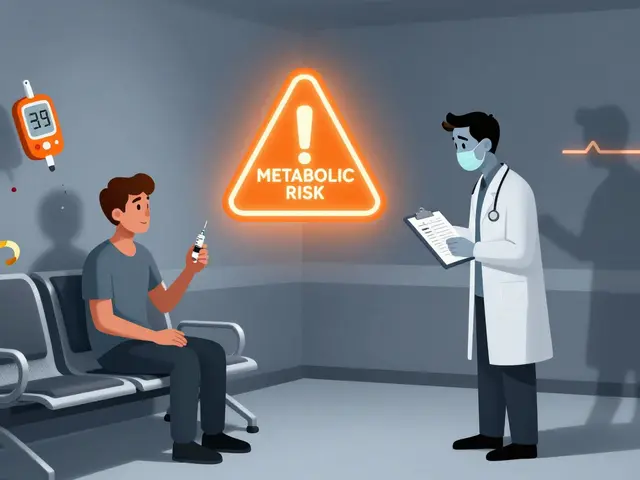Introduction: Why Talking About Trichomoniasis Is Important
Trichomoniasis, also known as "trich," is a very common sexually transmitted infection (STI) caused by a parasite. It affects both men and women, but women are more likely to experience symptoms. If left untreated, trichomoniasis can cause serious health problems and increase the risk of getting or transmitting other STIs, like HIV. That's why it's essential to talk to your partner about trichomoniasis and ensure both of you are tested and treated if necessary. In this article, I'll guide you through the process of discussing this sensitive topic with your partner.
1. Educate Yourself About Trichomoniasis
Before you can have a productive conversation with your partner about trichomoniasis, it's essential to educate yourself about the infection. Learn about its symptoms, how it's transmitted, and the available treatments. Understanding trichomoniasis will not only help you explain it to your partner, but it will also make you feel more comfortable during the conversation. There are plenty of reliable online resources you can use to learn about trichomoniasis, such as the Centers for Disease Control and Prevention (CDC) website.
2. Choose the Right Time and Place
Discussing sensitive topics like trichomoniasis requires a calm and comfortable environment. Choose a time when both you and your partner are relaxed and free from distractions. It's best to have this conversation in a private setting, like your home, where you can speak openly without fear of being overheard. Make sure you have enough time for a thorough discussion, so neither of you feels rushed.
3. Be Honest and Open
Honesty and openness are vital when talking about any sexual health issue, including trichomoniasis. If you've been diagnosed with trichomoniasis, be upfront with your partner about your test results and any symptoms you may have experienced. If you haven't been tested yet, but you're concerned about the possibility of having the infection, share your concerns with your partner. Being transparent will help you both make informed decisions about your sexual health.
4. Use Simple Language
When talking about trichomoniasis, use simple and straightforward language to explain the infection and its implications. Avoid using medical jargon or technical terms that your partner may not understand. Instead, focus on explaining the basic facts about trichomoniasis, such as how it's transmitted, its symptoms, and the available treatments. This will make it easier for your partner to grasp the information and engage in the conversation.
5. Be Supportive and Non-judgmental
It's crucial to approach the conversation about trichomoniasis with a supportive and non-judgmental attitude. Remember that anyone can contract an STI, and having trichomoniasis doesn't reflect your or your partner's character or worth. Make it clear that your goal is to protect each other's health and maintain a healthy relationship. Listen to your partner's concerns and feelings without criticism or blame, and offer reassurance and understanding.
6. Discuss Getting Tested and Treated
Once you've shared information about trichomoniasis, it's essential to discuss getting tested and treated if necessary. Encourage your partner to get tested, even if they don't have symptoms, as many people with trichomoniasis are asymptomatic. If either of you tests positive, it's vital to complete the prescribed treatment and abstain from sexual activity until both partners have been treated and the infection has cleared.
7. Talk About Preventing Future Infections
After discussing trichomoniasis and its treatment, it's important to talk about preventing future infections. Discuss the importance of regular STI testing and using condoms consistently and correctly during sexual activity. This will help reduce the risk of contracting or transmitting trichomoniasis and other STIs.
8. Address Emotional Repercussions
Conversations about STIs, including trichomoniasis, can be emotionally challenging for both partners. It's essential to acknowledge and address any emotions that may arise during the discussion, such as fear, guilt, or embarrassment. Reassure your partner that you're there to support them and that you can work together to overcome any challenges related to trichomoniasis.
9. Follow Up on the Conversation
After your initial conversation about trichomoniasis, it's important to follow up with your partner. Check in with them to see how they're feeling and if they have any additional questions or concerns. Encourage them to share their test results and discuss any necessary treatment steps. Maintaining open communication will help ensure both partners are informed and supported throughout the testing and treatment process.
10. Keep the Conversation Going
Talking about trichomoniasis with your partner is an essential step in maintaining a healthy sexual relationship. However, it shouldn't be a one-time conversation. Continue to discuss your sexual health regularly, including any concerns or changes in your health status. This ongoing communication will help you both stay informed, protect your health, and strengthen your relationship.



Emmy Segerqvist
6 May / 2023Oh my gosh!!! I can't even begin to describe how *heart‑pounding* this topic feels! 😱 The mere thought of bringing up trichomoniasis can turn a cozy night into an emotional roller‑coaster-full of dread, tears, and the desperate need for honesty!!! It’s like standing on a cliff, shouting your truth into the wind, hoping your partner catches the echo! So, grab a warm blanket, breathe deep, and let the conversation flow like a river after a storm!!!